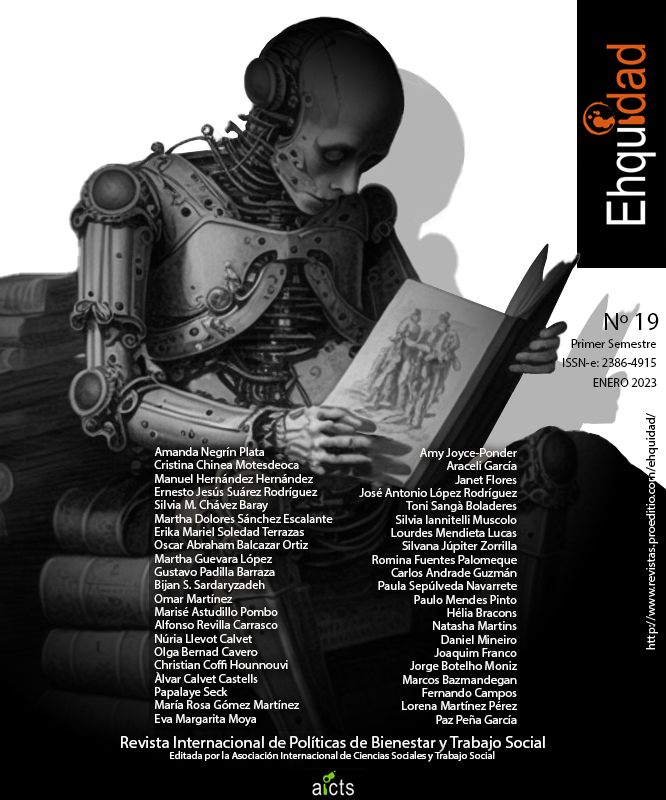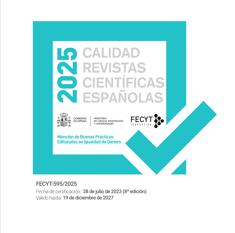Social Work Education and explanatory elements of disciplinary training in the field in the context of COVID-19. Lessons from the University of Cádiz
DOI:
https://doi.org/10.15257/ehquidad.2023.0008Keywords:
Social Work Education, Explanatory elements of the training, Accompaniment provided by the practice insertion center in the territories, Accompaniment provided by the university, Field educationAbstract
Field education is a component of the training process that allows the knowledge learned in the classroom to be applied in territorial spaces, which has been particularly difficult in the context of the COVID-19 pandemic. This requires accompaniment and monitoring for the acquisition of the expected skills. For this reason, the present study seeks to observe the relationship between the student's assessment of the support provided both by the practice center in the territories and by the university in the context of the pandemic. A quantitative design with an explanatory scope is used using secondary data for the analysis. As a result, it is highlighted that training in social work is correlated with how the students evaluate the accompaniment provided by the insertion centers in the territories and how they evaluate the accompaniment of the university in the field education process, which leads to the conclusion about the relevance of strengthening the conditions for accompaniment in the territories and the need for that the accompaniment given by the university to reinforce the link with the students in the training process.
Downloads
References
Abreu, J. (2020). Tiempos de Coronavirus: La Educación En Línea Como Respuesta a La Crisis. Daena: International Journal of Good Conscience 15(1):1–15.
Al-Nashif, N. (2018). Human Rights and Social Work. Global Social Work 8(1):9–18. doi: 10.1016/B978-0-08-097086-8.28040-9.
Andrade-Guzmán, C., and Eissmann-Araya, I. (2020). Educación Superior En Trabajo Social En Chile y Formación Para La Intervención En Situación de Calle. Desafíos Desde La Evaluación Que Interventores Hacen de Sus Procesos de Práctica Pre-Profesional. Prospectiva. Revista de Trabajo Social e Intervención Social 30:239–58. doi: 10.25100/prts.v0i30.8931.e-ISSN.
Andrews, P., and Harris, S. (2017). Using Live Supervision to Teach Counselling Skills to Social Work Students. Social Work Education 5479:1–13. doi: 10.1080/02615479.2016.1270929.
Beddoe, L., Ackroyd, J., Shirley-ann, C., and Appleton, C. (2011). Live Supervision of Students in Field Placement?: More than Just Watching Live Supervision of Students in Field Placement?: More than Just Watching. Social Work Education 30(5):512–28. doi: 10.1080/02615479.2010.516358.
Cea, M. (2004). Análisis Multivariable. Teoría y Práctica En La Investigación Social.
Chanto, C., and Mora, M. (2021). De La Presencialidad a La Virtualidad: Implicaciones Para La Población Estudiantil de La Universidad Nacional de Costa Rica, Ante La Pandemia Del COVID 19. Revista Nuevo Humanismo 9(2):19–38. doi: 10.15359/rnh.9-2.1.
Das, C., and Carter, J. (2014). Strategies for Critical Reflection in International Contexts for Social Work Students. International Social Work 57(2):109–20. doi: 10.1177/0020872812443693.
Diloretto, M., and Larocca, D. (2013). Desigualdad Educativa y Territorios. En Trabajo social y territorio: reflexiones sobre lo público y las instituciones, Testa, C. Buenos Aires: Espacio Editorial.
Ghiraldelli, R. (2020). Formación Profesional y La Práctica Supervisada En El Servicio Social Brasileño. Prospectiva. Revista de Trabajo Social e Intervención Social (29):39–56. doi: 10.25100/prts.v0i29.7554.
Giraldez, S. (2013). Diálogos En El Territorio. Organizaciones y Políticas Sociales, Sus Mutuas Implicancias. En Trabajo Social y territorio: reflexiones sobre lo público y las instituciones (pp. 21-31), Testa, C. Buenos Aires: Espacio Editorial.
Gujarati, D., and Porter, D. (2010). Econometría. México, México: McGraw-Hill / Interamericana Editores, S.A. De C.V.
Healy, K. (2001). Trabajo Social: Perspectivas Contemporáneas. Vol. O. Ediciones Morata.
Jorquera, R., and Herrera, F. (2020). Salud Mental En Funcionarios de Una Universidad Chilena: Desafíos En El Contexto de La COVID-19. Revista Digital de Investigación En Docencia Universitaria 14(2):e1310. doi: 10.19083/ridu.2020.1310.
Kourgiantakis, T., Sewell, K. and Bogo, M. (2018). The Importance of Feedback in Preparing Social Work Students for Field Education. Clinical Social Work Journal 0(0):0. doi: 10.1007/s10615-018-0671-8.
López-Jara, A., Ruiz-Ruiz, M. and Gordillo-Mera, S. (2021). La Educación Virtual En Tiempo de COVID En La Universidad Católica de Cuenca Sede Macas. Dominio de Las Ciencias 7(5):561–80.
Marco-Ahulló, A, Villarrasa-Sapiña, I. and Monfort-Torres, G. (2022). Estudio Descriptivo Sobre Las Diferencias de Género En El Estrés Académico Derivado Del Contexto COVID-19 En Población Universitaria Española. Retos 43:845–51.
Ministerio de la Presidencia, Relaciones con las Cortes y Memoria Democrática, 2020. Real Decreto 463/2020, de 14 de marzo, por el que se declara el estado de alarma para la gestión de la situación de crisis sanitaria ocasionada por el COVID-19
Ministerio de Educación, Cultura y Deporte. (2019). Graduado o Graduada En Trabajo Social Por La Universidad de Cádiz. Retrieved (https://sede.educacion.gob.es/cid).
Naciones Unidas. (1995). Derechos Humanos y Trabajo Social. Manual Para Escuelas de Servicio Social y Trabajadores Sociales Profesionales. 1–99.
Ozamiz-Etxebarria, N., Dosil, M., Idoaiga, N., and Berasategi, N. (2021). Estado Emocional Del Profesorado de Colegios y Universidades En El Norte de España Ante La COVID-19. Rev Esp Salud Pública, 95.
Parola, R. (2020). Problematizando Las Prácticas Preprofesionales En Trabajo Social. Desafíos y Perspectivas. Prospectiva. Revista de Trabajo Social e Intervención Social 29(2020):73–92. doi: 10.25100/prts.v0i29.8714.
Puig-Cruells, C. (2020). El Rol Docente Del Tutor y Supervisor de Prácticas En Trabajo Social: Construcción de La Reflexividad y El Compromiso Durante La Formación a Través de La Supervisión. Prospectiva. Revista de Trabajo Social e Intervención Social 29(2020):57–72. doi: 10.25100/prts.v0i29.8084.
De Robertis, C. (2018). Los Derechos Humanos, Principios Orientadores de La Práctica Del Trabajo Social. Global Social Work 8(0):19–34. doi: 10.30827/tsg-gsw.v8i0.7258.
Robertson, J. (2013). Addressing Professional Suitability in Social Work Education: Results of a Study of Field Education Coordinators’ Experience. Journal of Practice Teaching & Learning 11(May 2013):98–117. doi: 10.1921/2402110307.
Rojas, D., and Rodríguez, M. (2013). Conceptualización de Territorio En Trabajo Social: Aportes y Reflexiones. Tendencias y Retos 18(2):61–78.
Rubilar, G. (2018). Trabajo Social y Derechos Humanos: Perspectivas, Posibilidades y Desafíos a Partir de La Experiencia Chilena. Global Social Work 8(0):120–44. doi: 10.30827/tsg-gsw.v8i0.6494.
Staub-Bernasconi, S. (2016). Social Work and Human Rights—Linking Two Traditions of Human Rights in Social Work. Journal of Human Rights and Social Work 1(1):40–49. doi: 10.1007/s41134-016-0005-0.
Talavera-Salas, I., Zela-Pacori, C., Calcina-Cuevas, S. and Castillo-Machaca, J. (2021). Impacto de La Covid-19 En El Estrés Académico En Estudiantes Universitarios. Dominio de Las Ciencias 7(4):1673–88.
Testa, C. (2015). Espejos Cruzados. Relaciones Entre Pobreza Persistente y Déficit de Infraestructura. En Instituciones y territorio: reflexiones de la última década (pp. 77-90). Testa, C. Buenos Aires: Espacio Editorial.
Vázquez, O. (2005). Libro Blanco Título de Grado En Trabajo Social. Agencia Nacional de Evaluación de la Calidad y Acreditación.
Wayne, J., Raskin, M., and Bogo, M. (2010). Field Education as the Signature Pedagogy of Social Work Education. Journal of Social Work Education 46(3):327–39. doi: 10.5175/JSWE.2010.200900043.
Published
Versions
- 2023-01-20 (2)
- 2023-01-09 (1)












